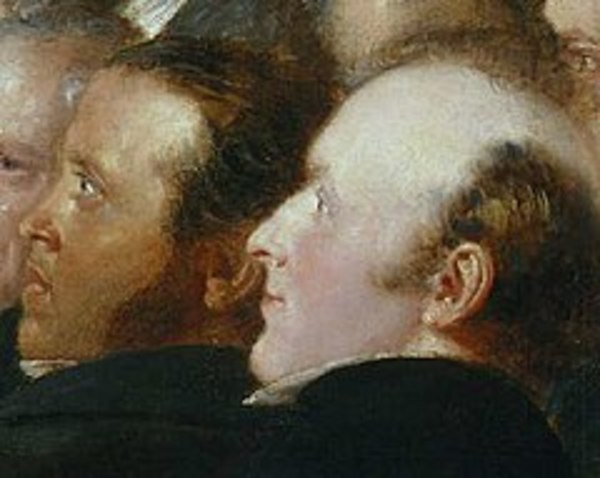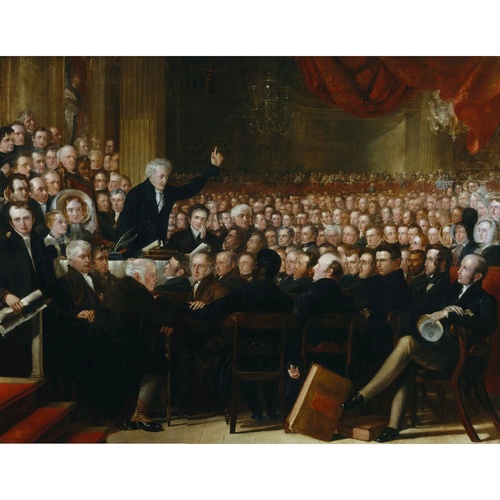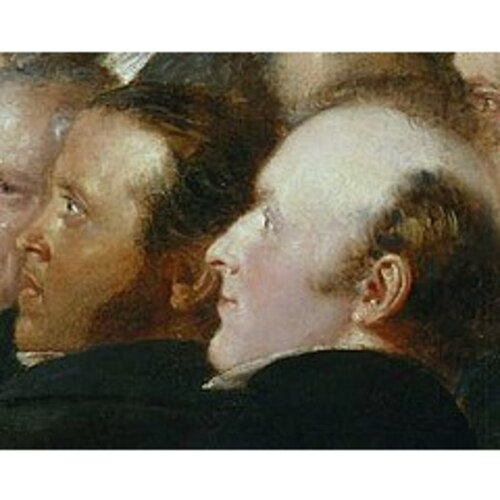
Source: Courtesy of Wikimedia Commons
SCOBLE, JOHN, anti-slavery leader and politician; b. 15 Jan. 1799 at Kingsbridge, Devonshire, England; m. 12 May 1825 Mary Anne Stainburn in London, and they had eight children; d. 11 Nov. 1877 in Northam, Devon.
John Scoble was educated in Devon and London, and became a Congregational minister. In 1831 he was appointed one of the full-time lecturers for the Agency Committee of the Anti-Slavery Society. Following the passage of the 1833 Emancipation Act, the committee separated from the Anti-Slavery Society to become the more radical Society for the Universal Abolition of Slavery and the Slave Trade, and Scoble became its secretary. Joseph Sturge, a wealthy corn merchant, was its patron, and in 1836 he organized an expedition to the West Indies to examine the apprenticeship system which had supplanted slavery. Scoble joined it and published one of the four pamphlets, British Guiana, which resulted from the mission. Scoble concluded that apprenticeship was bad in principle, and that the Emancipation Act was being continually and systematically violated. In 1838 the agitation of abolitionists bore fruit and the apprenticeship system was abolished. The Central Negro Emancipation Committee, formed in 1837 to fight the West Indian system, sent Scoble to the West Indies and the United States in 1839 to disseminate the findings of the West Indian mission.
Schisms in the abolitionist movement
American abolitionists welcomed Scoble’s interesting, forceful, and authoritative lectures and recognized the value of this personal link with British anti-slavery activity. During the visit, however, Scoble witnessed the serious rift between William Lloyd Garrison and other abolitionists led by Lewis Tappan and James G. Birney. Garrison opposed the use of political action for ending slavery and alienated many abolitionists with his abusive language toward churches and with his strong support of the peace movement and of the women’s rights movement. Scoble supported Tappan and Birney and in 1839 reported his impressions of the disagreement to the British and Foreign Anti-Slavery Society, of which he was a charter member. In organizing the World Anti-Slavery Convention of 1840, the BFASS ruled that women could attend as observers but not as delegates, a decision which offended Garrison’s supporters and transferred the rift to Britain. Although supported by British and American moderates, Scoble’s opposition to Garrison’s anti-political and anti-Christian views was considered by Garrisonians as an attempt to downgrade the significance of American slavery. Their impression of Scoble’s insincerity and racial prejudice was reinforced by his suggestion to the painter of the 1840 convention portrait that he not be placed next to a Black abolitionist.
As secretary of the BFASS from 1842 until 1852, Scoble was involved in world anti-slavery and peace congresses in 1843, 1849, and 1850. He successfully reorganized the anti-slavery movement in France by creating permanent and decentralized associations which were not exclusively tied to legislative lobbying. His feud with the Garrisonians was, however, a factor in his resignation as secretary of the BFASS in September 1852.
Moving to Canada
Scoble was drawn to Canada by the affairs of the British American Institute of Science and Industry near Dresden in Dawn Township, Canada West. The institute had opened in December 1842 as an academic and vocational school for Black people, especially fugitive slaves, but it did not exclude whites and Indigenous people. The sale of agricultural and timber products from its 300 acres, in addition to contributions, was expected to provide financial support. Interest in the institute was rekindled in 1851 by the visit to England of Josiah Henson*, a fugitive slave and manager of the institute. The success of Henson’s visit seeking funds for the institute was hampered by charges made by Edward Mathews, a Baptist minister, and Samuel J. May and Hiram Wilson, both original trustees of the institute, that he did not speak for the trustees and that his financial management was faulty. Scoble visited Canada in 1851 on behalf of a London committee of antislavery philanthropists who shared membership in the BFASS to investigate the situation for them and find ways of helping Henson and the institute. The trustees in Canada agreed to surrender their trust to the London committee on the understanding that the committee would meet the institute’s liabilities to $7,000 and pursue its educational aims. The committee requested Scoble, who moved to Canada, and John Roaf of Toronto, another of the original trustees, to act for them in settling most of the institute’s heavy liabilities at the rate of 63 cents to the dollar. They accomplished this settlement by the end of 1853, and, despite rumours to the contrary, Scoble received no pecuniary advantage from the settlement of accounts. Attempts at incorporation of the institute in Canada to end the liability of individuals in the event of bankruptcy were frustrated by James C. Brown, a trustee who refused to surrender his trust to the London committee.
Further disputes between former and current trustees throughout the 1850s hampered Scoble’s efforts to achieve financial stability for the institute and to erect buildings and provide schooling from primary to college levels. Despite his understanding that the school was racially integrated and supported by voluntary funds, Scoble learned in 1852 that it received government support as a separate school for Black people. He paid the school taxes and did not interfere with its operation, though he was relieved when it moved to Dresden in 1855. He discouraged donations until there could be proper guarantees against any such misappropriation of funds as had occurred before 1851, and because he believed local financial support must come first. The property produced little revenue because of difficulties with tenants, previous poor management, and the expense of clearing and fencing the land; these problems were compounded by the petty obstructions of Brown and serious disagreements with Henson. The American Baptist Free Mission Society, tenants on the land from 1851 to 1853, resented Scoble’s control, and in 1853 its agents departed with everything portable. Unable to find a suitable tenant and faced with extensive repairs, Scoble himself farmed the property. Henson was the tenant from 1857 to 1860; disagreements between him and Scoble over rents, improvements to the property, and payment for services as manager resulted in a series of lawsuits between 1861 and 1863. Henson hoped to gain control of the property because he was convinced that Dawn could achieve its educational goals. Scoble had resigned his trusteeship in December 1861 and requested in 1863 that the court appoint a receiver and reimburse him for certain expenses and legal costs. The court accepted Scoble’s suggestion, but the property under court management did not produce sufficient revenue. Interest in the institute among Black settlers in the area waned, and when incorporation was granted in 1868, the institute and lands were sold, with the revenues from the sale intended to endow the Wilberforce Educational Institute, an integrated school in Chatham.
An active Reformer
In the winter of 1860–61 Scoble had played a prominent role in preventing the extradition of John Anderson, a fugitive slave wanted for murder in Missouri. An active Reformer in politics, Scoble was the secretary of the Reform Convention of 1859, and in the 1861 election ran in Elgin West. Initially, George Macbeth won the contest, but allegations of election corruption led to his disqualification and Scoble was declared the winner on 23 Feb. 1863. He won re-election later that year. During the discussions leading to confederation, he advocated a legislative union decentralized by a strong system of municipal government and by representation by population. He joined John A. Macdonald* and John Sandfield Macdonald* in opposing the recommendations of George Brown*’s “Parliamentary Reform Committee” in June 1864, but he supported the “Great Coalition” formed at the same time. He continued to support it from George Brown’s resignation in December 1865 until 1867. Brown and others worked actively and with success to prevent Scoble’s renomination in 1867, and even local Reformers who respected his talents were suspicious of someone who was “smooth as an iceberg.” In a series of letters to the London Free Press in June and July 1867, Scoble ably defended his course, opposed the Reform Convention of 1867, and argued that Reformers ought to have supported the “Liberal element in the Cabinet” of John A. Macdonald.
Scoble was a forceful and self-assured man, well known in both Canada and Britain. He married Mary Anne Stainburn in 1825. During his tour of New England, abolitionist newspapers published the poems he had written for Mary Anne while touring the West Indies. The couple had four sons and four daughters. One son, Sir Andrew Richard Scoble, became a member of the Judicial Committee of the Privy Council in the 1890s, and another, Thomas Clarkson Scoble, was an early advocate of the Hudson Bay Railway in Manitoba. Little is known of Scoble’s final years, though he seems to have returned to England after his wife’s death in 1876. He died in Northam, Devon, in 1879.
John Scoble was the author of British Guiana . . . (London, 1838); Texas: its claims to be recognized as an independent power, by Great Britain . . . (London, 1839); Hill coolies; a brief exposition of the deplorable condition of the hill coolies in British Guiana and Mauritius . . . (London, 1840); and with G. W. Alexander, Liberté immédiate et absolue, ou esclavage . . . (Paris, 1844). He also wrote an introduction to Lewis Tappan, Reply to charges brought against the American and Foreign Anti-Slavery Society (London, 1852).
Boston Public Library, Anti-slavery coll. Rhodes House Library, University of Oxford, mss Brit. Emp. s.16–24 (Anti-Slavery Soc., anti-slavery papers, 1820–1951), British and Foreign Anti-Slavery Soc. papers. University of London, University College Library, Lord Brougham papers. UWO, 255 (John Scoble papers); Middlesex County, Court of Chancery files, no.103. [J. G. Birney], Letters of James Gillespie Birney, 1831–1857, ed. D. L. Dumond (2v., New York and London, 1938). British and Foreign Anti-Slavery Soc., Annual report (London), 1852. Can., Prov. of, Confederation debates. Four fugutive slave narratives, ed. R. W. Winks et al. (Reading, Mass., 1969). Globe, 1852–53; Nov. 1860–Feb. 1861. London Free Press, 1860–61; June–July 1867. Provincial Freeman (Windsor; Toronto; Chatham), 1852–53. A side-light on Anglo-American relations, 1839–1858, furnished by the correspondence of Lewis Tappan and others with the British and Foreign Anti-Slavery Society, ed. A. H. Abel and F. J. Klingberg (Lancaster, Pa., 1927). CPC, 1863. Careless, Brown. Victor Lauriston, Romantic Kent; more than three centuries of history, 1626–1952 (Chatham, Ont., 1952). A. L. Murray, “Canada and the Anglo-American anti-slavery movement: a study in international philanthropy” (unpublished phd thesis, University of Pennsylvania, Philadelphia, 1960). W. H. and J. H. Pease, Black Utopia; Negro communal experiments in America (Madison, Wis., 1963). Howard Temperley, British antislavery, 1833–1870 (London, 1972). Winks, Blacks in Can.
Bibliography for the revised version:
Ancestry.com, “London, England, Church of England marriages and banns, 1754–1936,” John Scoble and Mary Ann Stainburn, 12 May 1825: www.ancestry.ca/search/collections/1623 (consulted 17 July 2022). Findmypast, “Devon baptisms,” John Scoble, 1 Feb. 1799: www.findmypast.co.uk (consulted 17 July 2022). Christian Reflector (Worcester, Mass.), 4 Sept. 1839. The Emancipator (New York), 12 Sept. 1839. Globe, 29 Nov. 1877. North Devon Journal (Barnstaple, Eng.), 15, 22 Nov. 1877.
Cite This Article
Elwood H. Jones, “SCOBLE, JOHN,” in Dictionary of Canadian Biography, vol. 9, University of Toronto/Université Laval, 2003–, accessed March 1, 2026, https://www.biographi.ca/en/bio/scoble_john_9E.html.
The citation above shows the format for footnotes and endnotes according to the Chicago manual of style (16th edition). Information to be used in other citation formats:
| Permalink: | https://www.biographi.ca/en/bio/scoble_john_9E.html |
| Author of Article: | Elwood H. Jones |
| Title of Article: | SCOBLE, JOHN |
| Publication Name: | Dictionary of Canadian Biography, vol. 9 |
| Publisher: | University of Toronto/Université Laval |
| Year of publication: | 1976 |
| Year of revision: | 2025 |
| Access Date: | March 1, 2026 |




